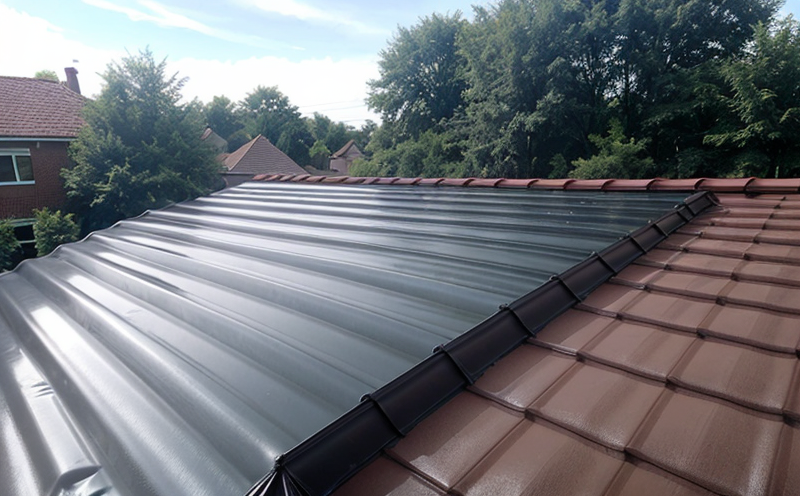ISO 6946 Thermal Performance of Roof Assemblies
The thermal performance of roof assemblies is a critical factor in ensuring energy efficiency and comfort within buildings. The ISO 6946 standard provides a method for determining the thermal resistance (R-value) of roof assemblies, which helps to evaluate their insulating properties under both laboratory and real-world conditions.
Roofing materials and systems play a significant role in managing heat transfer between the interior and exterior environments. Understanding this performance is essential for architects, engineers, and construction professionals who strive to design sustainable buildings that meet energy efficiency standards.
The ISO 6946 test involves subjecting roof assemblies to controlled thermal conditions in a specially designed chamber. This allows for accurate measurement of the heat flow through the assembly. The data collected is then used to calculate the R-value, which indicates how well the assembly resists heat transfer. A higher R-value signifies better insulation and energy efficiency.
This testing method can be particularly useful in regions with extreme temperatures or where there are strict regulations regarding building energy performance. By ensuring compliance with these standards, architects and builders can contribute to reducing overall energy consumption while enhancing occupant comfort.
For R&D engineers working on new roofing materials or systems, this test provides valuable insights into the thermal properties of their innovations. It also aids in identifying areas for improvement or optimization. Compliance officers responsible for ensuring adherence to local and international standards will find this testing indispensable in maintaining regulatory compliance.
Scope and Methodology
| Parameter | Description |
|---|---|
| Thermal Resistance (R-value) | The thermal resistance of a material or assembly is defined as the ratio of the temperature difference between two surfaces of the material to the heat flux through it. For roof assemblies, this value indicates how effectively they insulate against heat flow. |
| Test Chamber | The test is conducted in a controlled environment chamber that simulates real-world conditions. This includes maintaining precise temperature and humidity levels to ensure accurate results. |
| Specimen Preparation | The roof assembly must be prepared according to specific dimensions and configurations as per the ISO 6946 guidelines. Proper specimen preparation ensures consistent testing conditions across different samples. |
| Instrumentation | Specialized equipment is used to measure temperature differences and heat fluxes accurately. These instruments are calibrated regularly to maintain precision. |
The testing process typically involves placing the prepared roof assembly in a thermal chamber where controlled heating or cooling is applied. Temperature sensors are strategically placed on both sides of the assembly to measure temperature differences accurately. Heat flux sensors capture the amount of heat passing through the assembly.
Once the equilibrium state is reached, the data collected from these sensors is analyzed using specific formulas provided in ISO 6946 to calculate the R-value. The results are then reported according to standard formats, providing a clear picture of the thermal performance of the roof assembly.
Eurolab Advantages
EuroLab offers comprehensive and reliable ISO 6946 testing services that cater specifically to the unique requirements of roofing and waterproofing materials. Our state-of-the-art facilities equipped with cutting-edge instrumentation ensure precision and accuracy in every test conducted.
Our team comprises experts who possess extensive experience in conducting such tests, ensuring that each sample is handled meticulously from preparation to final analysis. We employ stringent quality control measures throughout the entire testing process, guaranteeing consistent results across multiple samples if necessary.
EuroLab’s commitment to upholding international standards means we adhere strictly to ISO 6946 guidelines during all our tests. This not only enhances credibility but also ensures that clients receive reports that are easily integrable into broader sustainability initiatives or compliance documentation.
Moreover, EuroLab offers additional value-added services such as consultation on optimizing thermal performance through material selection and design modifications based on test results. We provide detailed reports tailored to meet the needs of various stakeholders including architects, engineers, contractors, and property owners.
Why Choose This Test
Selecting the appropriate testing method for evaluating roof assembly thermal performance is crucial in achieving desired outcomes. Here are several reasons why choosing ISO 6946 makes sense:
International Recognition: Adherence to internationally recognized standards like ISO ensures that your results are universally accepted and understood.
Consistency: Using standardized procedures guarantees consistent outcomes, making it easier for different parties involved in a project to compare data accurately.
Regulatory Compliance: Many jurisdictions require compliance with specific thermal performance criteria. Demonstrating adherence through ISO 6946 testing helps avoid potential penalties and enhances reputation.
Innovation Support: For R&D teams, this test provides essential data that can guide further development efforts towards more efficient and effective roofing solutions.
Sustainability Focus: With increasing emphasis on environmental responsibility, demonstrating superior thermal performance aligns well with broader sustainability goals.





